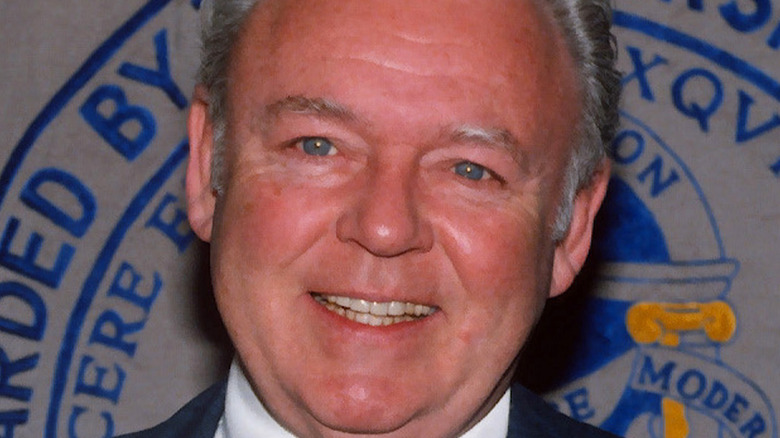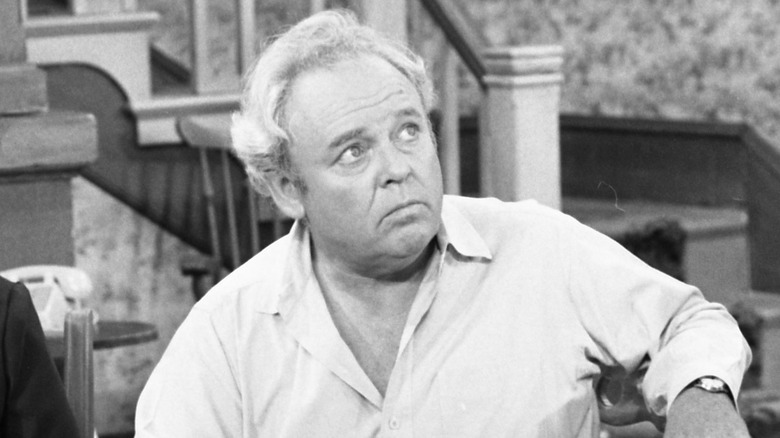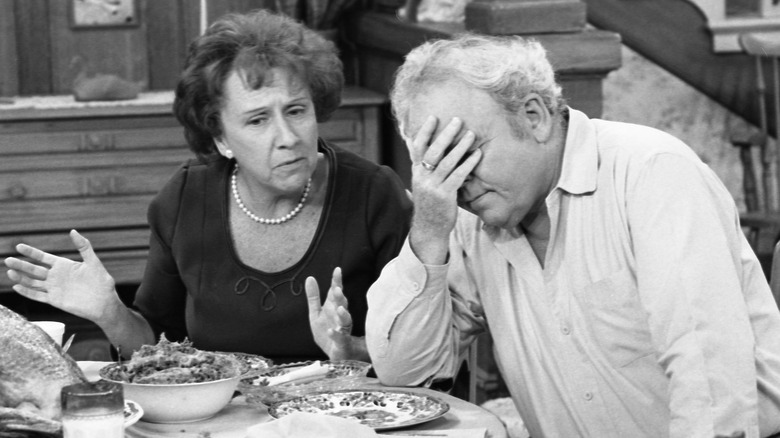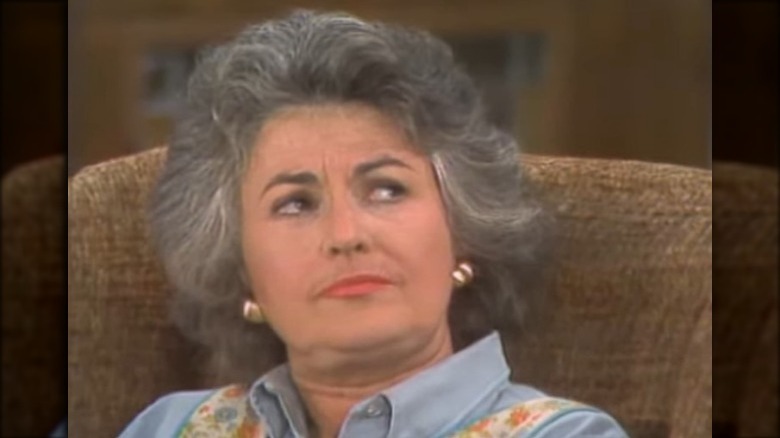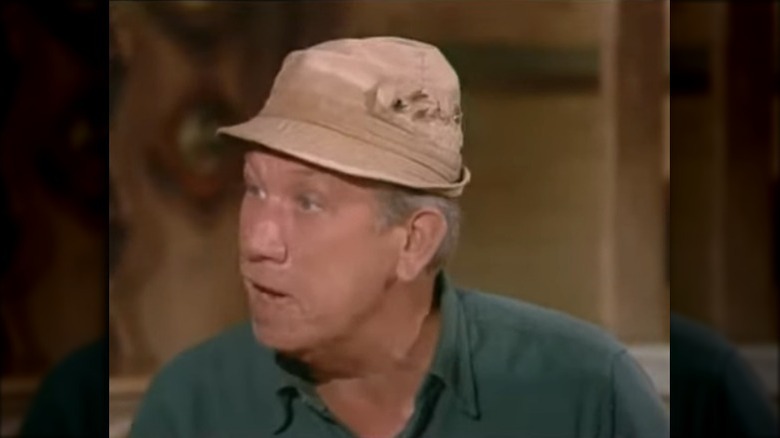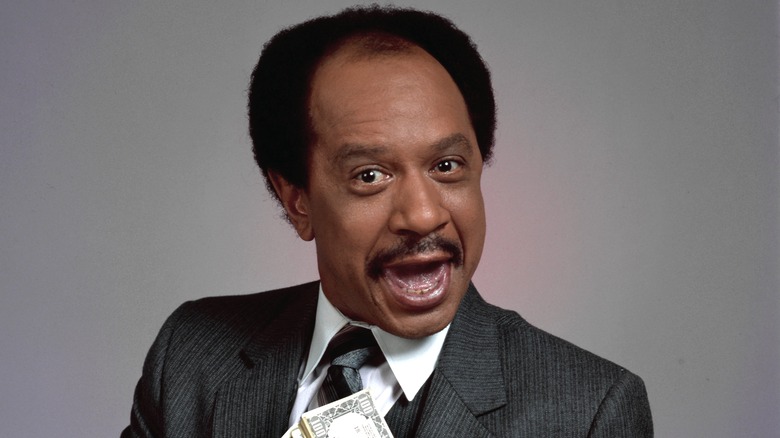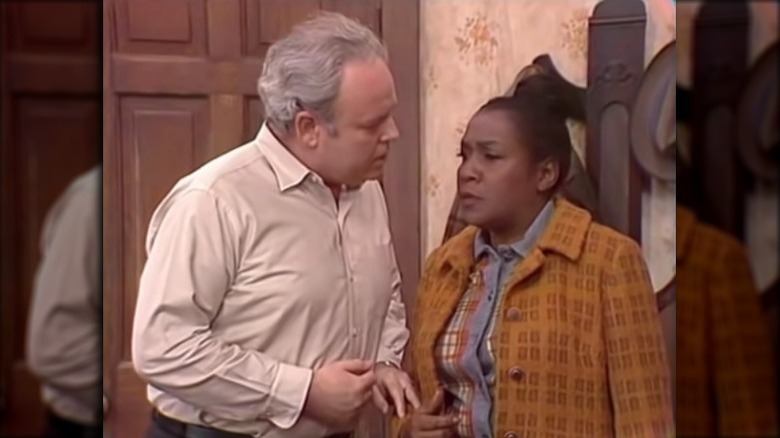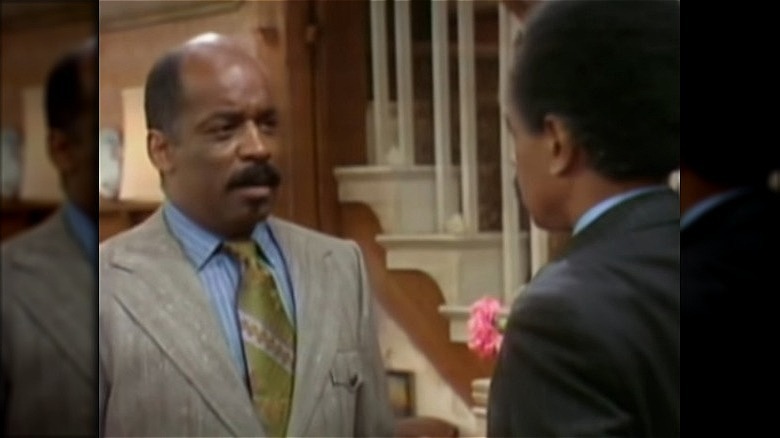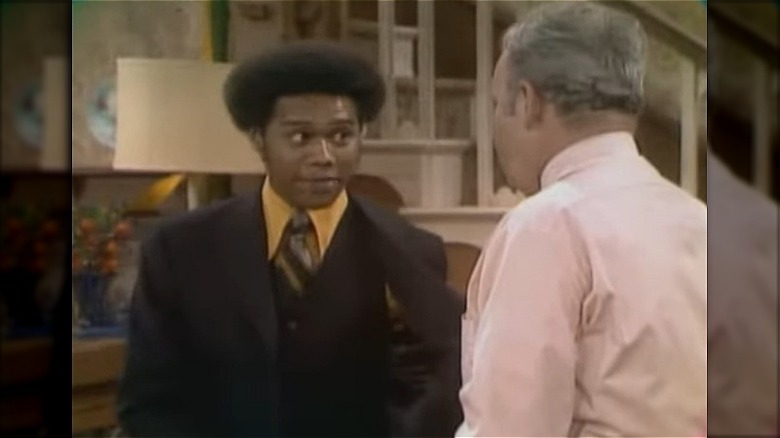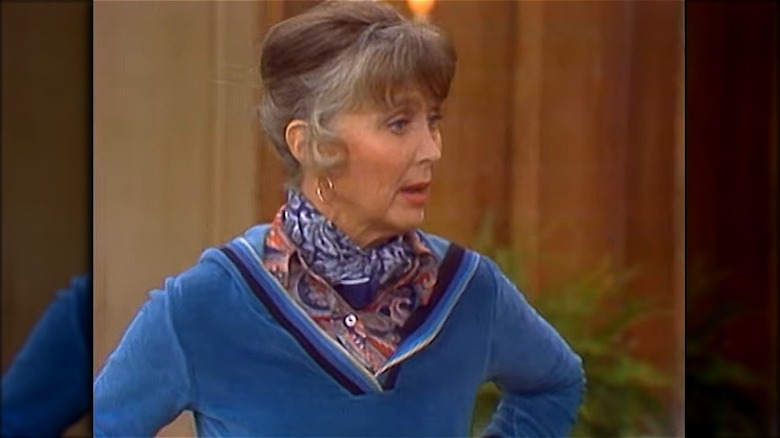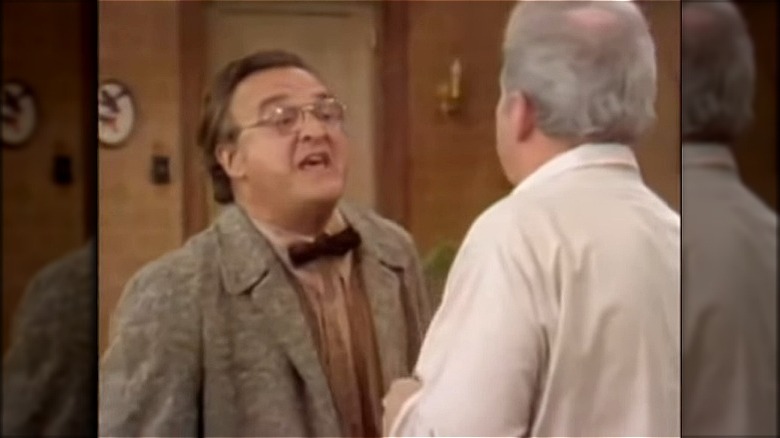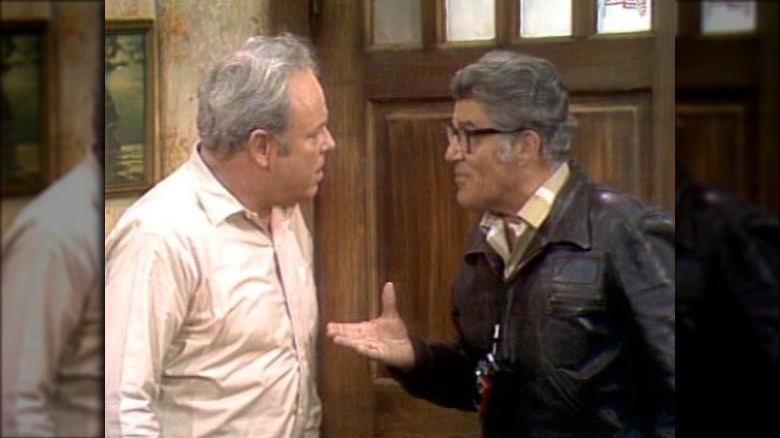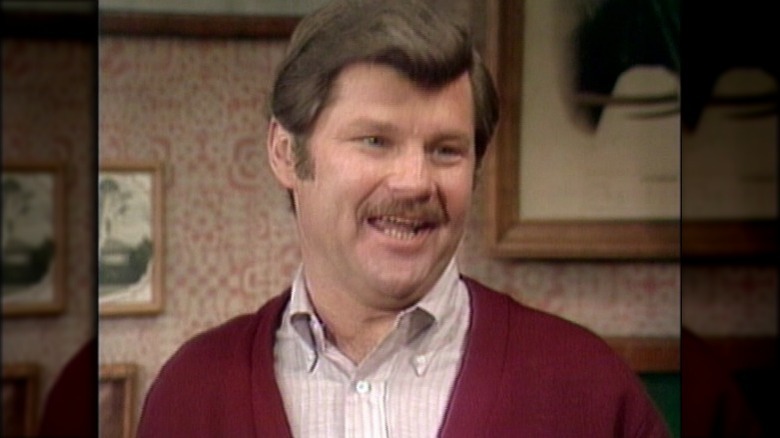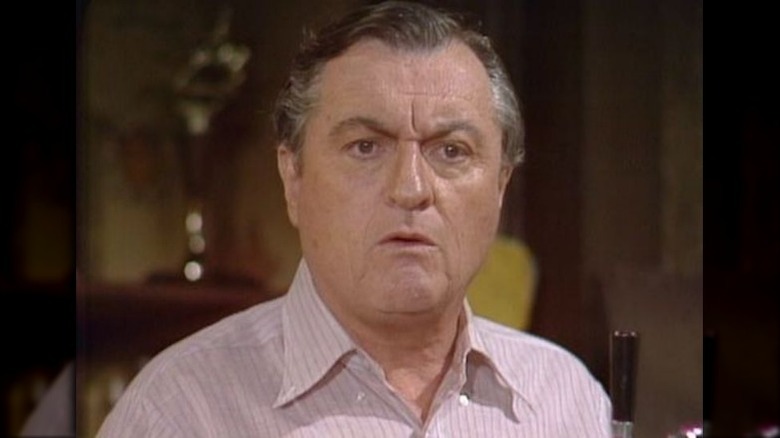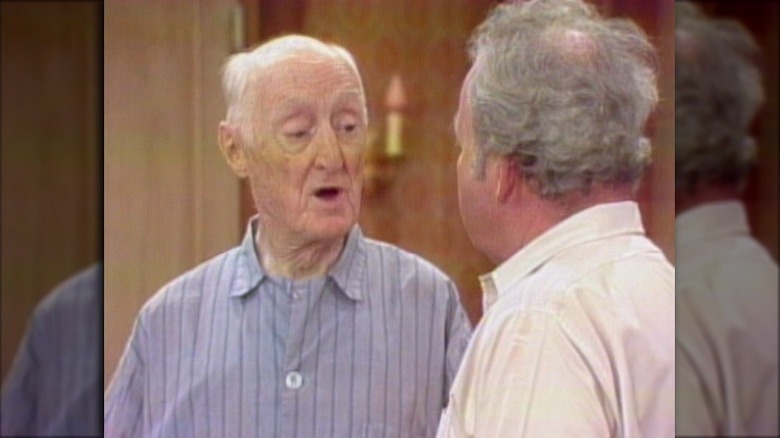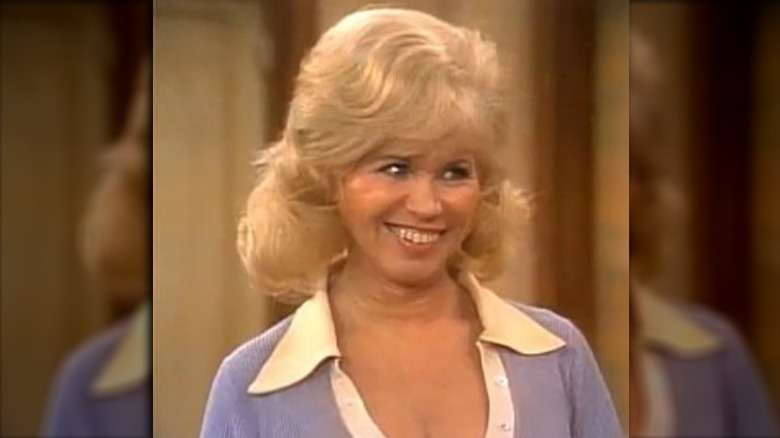Stars From All In The Family You Didn't Know Died
Ask any critic what they think of "All in the Family," and you're likely to hear the same answer over and over — it changed TV. The Atlantic noted that the series "was the first step on the road toward the Peak TV we are living through today." NPR called it "groundbreaking." Time included it on its list of the 100 greatest TV shows of all time.
But as NPR points out, it's also a show that arguably would never work today, as the main character — "a blue-collar bigot from Queens" — and the many slurs and sexist jokes that pepper the dialogue aren't exactly PC. However, the plotlines, which typically tackle more serious issues like racism, war, women's rights, LGBTQ+ rights, and rape — all things TV writers are still trying to address — might stand a chance in today's climate. Still, whether it was the pure luck of hitting the airwaves at just the right time or the brilliance of the writers and producer Norman Lear, who managed to make the characters "lovable" in spite of it all, "All in the Family" was a smash hit.
Airing from 1971 to 1979 (and dominating Nielsen ratings for five of those years), it spawned a number of spin-offs, including "Archie Bunker's Place," "The Jeffersons," and "Maude." It also made many of its actors household names, but a good number of those performers are sadly no longer with us. From Carroll O'Connor to Sherman Hemsley, these are the "All in the Family" stars you may not know have died.
Carroll O'Connor
Carroll O'Connor is living proof that this whole idea that one must find success by 30 or be doomed to live a merely mediocre life is a bunch of hogwash. See, O'Connor didn't find fame until the age of 46, when he landed the role that would make him a star: Archie Bunker, the bigoted patriarch on "All in the Family." Born in New York in 1924, O'Connor tried his hand at a smattering of different careers, from journalism to a stint in the marines to substitute teaching, before he established himself as a reliable character actor in the early 1960s.
But it was as Archie Bunker that O'Connor really hit his stride. Famed writer and producer Norman Lear created "All in the Family" for CBS, but O'Connor made the series, and the character, the cultural touchstone it is today. The New York Times wrote that O'Connor's handling of Archie made him "a complex, not-always-wrong sympathetic figure to most of the 50 million weekly viewers in America," a huge accomplishment considering Bunker was vocal about his hatred for Black people, Jews, women, and so on.
O'Connor was so successful in the role that he was given unprecedented "creative control" of the series and its follow-up, "Archie Bunker's Place," according to TCM. He was consulted about both storylines and dialogue, penned the show's closing theme, and made $100,000 each episode (an amount no other TV actor was taking home at the time). Five Emmy Awards (four for "All in the Family") later, O'Connor died of a heart attack at age 76 in 2001.
Jean Stapleton
Archie Bunker's better half — his sweet if maybe a little dim-witted wife, Edith Bunker — was played by Jean Stapleton. Stapleton's lead role "made her one of the foremost women in television comedy in the 1970s" and something of a feminist icon, according to The New York Times, especially as her character progressed from housewife to empowered community leader.
Prior to the three-time Emmy winner's success on "All in the Family," which came at nearly age 50, Stapleton appeared in several Broadway productions, like "Bells are Ringing" and "Funny Girl," and landed supporting roles in a number of movies, including "Damn Yankees" and "Klute." In 1979, after becoming tired of playing Edith, she departed from the series that made her a household name. She'd go on to accept a number of other roles in projects like "Eleanor: First Lady of the World" and the Off Broadway productions of "The Carpetbagger's Children," "The Entertainer," and "The Birthday Party," all of which, according to The Times, were attempts to "separate" herself from the Queens housewife character.
In 2013, Stapleton died at the age of 90. Her kids released a statement (via The Hollywood Reporter) that said, in part, "Being the children of a beloved Mother on Television means sharing the spirit of who Jean Stapleton was with her friends and fans. It is with great love and heavy hearts that we say farewell to our collective Mother, with a capital M. Her devotion to her craft and her family taught us all great life lessons."
Bea Arthur
"All in the Family" wouldn't have worked as well as it did without characters who balanced out Archie Bunker's bigotry. Maude Findlay, a cousin of Edith's played by Bea Arthur, was one such foil. An outspoken, liberal feminist, Maude was everything Archie was not — and fans loved it.
In fact, Maude was so popular she wound up getting her own spin-off, appropriately titled "Maude." The series, which ran for six seasons, frequently tackled serious issues that were considered taboo, like divorce, addiction, LGBTQ+ rights, and women's liberation. In one particularly memorable episode (that aired two months before Roe v. Wade was decided), Maude decides to abort a late-in-life pregnancy, a move that both landed Arthur at the center of a media storm and made her a leading figure in the feminist movement.
Of course, it took some serious work from Arthur to get to a place where she could hold her own as the star of a series that addressed such intense topics. According to The New York Times, she got her start on stage, winning a Tony Award for her role in "Mame" in 1966, before making the jump to TV and film. Many fans will also remember her as prickly Dorothy Zbornak from "The Golden Girls," a role she played for seven seasons. In 1992, after winning two Emmy Awards for her work, Arthur began what CNN called a sort of "semi-retirement," only electing to take part in a handful of projects over the next decade and a half. In 2009, she died at age 86 of lung cancer complications.
Allan Melvin
A 2013 book titled "The Greatest Sitcoms of All Time" called Allan Melvin "one of the finest and most recognized character actors in the history of American television." A quick peek at his life, and at his filmography, reveals that the descriptor isn't an exaggeration in the slightest.
Born in 1923, Melvin got his start in NBC radio's sound effects department, per the Los Angeles Times. After landing roles in a number of radio soap operas, he found work on Broadway, starring in the original run of "Stalag 17," and then jumped to TV in the mid-'50s. Over the course of the next five decades, he appeared in everything from "The Phil Silvers Show" and "The Dick Van Dyke Show" to "The Andy Griffith Show," "Gomer Pyle: USMC," and "The Brady Bunch." Melvin also lent his voice to a number of animated series in the '70s, '80s, and '90s.
On "All in the Family" and "Archie Bunker's Place," Melvin played Barney Hefner, Archie's neighbor and best friend. The role would mark Melvin's last on-screen acting gig. In 1983, when the spin-off went off the air, he elected to retire from being seen on the small screen, choosing to focus on voice acting work and family life. In 2008, Melvin died of cancer. He's buried not far from his former co-star and on-screen pal, Carroll O'Connor, at the Westwood Memorial Park. A true full-circle moment for two men who arguably changed TV history.
Sherman Hemsley
As a character, Archie Bunker is largely defined by his whiteness. In contrast, his neighbor, George Jefferson, is largely defined by his Blackness. Played by Sherman Hemsley, George was just as suspicious and "distrustful of white people as Archie was of black people (and almost everyone else)," noted The New York Times — a dichotomy that allowed for some interesting storylines and impactful conversations.
Born in Philadelphia in 1938, Hemsley didn't begin to pursue an acting career until he was discharged from the Air Force in the '60s. One of his first major roles after moving to NYC was in the musical "Purlie" on Broadway. Norman Lear happened to catch the production and once said how he felt that "the cocky energy of the guy was totally in sync with the offstage image we had created of George," according to The Times. Because of other commitments, Hemsley didn't actually appear on "All in the Family" until 1973, but the show's creator was so sure of his choice that he was content to just make references to the character until Hemsley's schedule freed up.
After "All in the Family" and Hemsley's equally successful spin-off "The Jeffersons" went off the air in 1985, the actor worked on a handful of other TV projects, including "Amen," "The Fresh Prince of Bel-Air," "The Wayans Brothers," and "House of Payne." In 2012, TMZ reported that the actor had died of a lung mass. He was 74.
Isabel Sanford
While Archie Bunker and George Jefferson were never exactly friends, Edith Bunker and Louise Jefferson (George's wife) most certainly were. Kind-hearted and street-smart, Louise balanced out her hot-headed husband the same way Edith did hers.
Like so many of the other performers on our list, Isabel Sanford didn't begin acting professionally until later in life. In 1965, she was cast in James Baldwin's play "The Amen Corner," making her Broadway debut at the age of 47, per The New York Times. This role led to a part in "Guess Who's Coming to Dinner?" which, in turn, caught the attention of major Hollywood players like Norman Lear. "All in the Family" certainly helped launch Sanford's career to new heights, but it was the spin-off "The Jeffersons" that made her a household name. In 1981, her work on the latter show made her the first Black woman to win an Emmy Award for best actress in a comedy series.
Unfortunately, Sanford wasn't able to parlay that success into other major roles. After "The Jeffersons" wrapped, she was only offered guest-star parts on sitcoms like "Living Single," "Hangin' with Mr. Cooper," and "Dream On." In 2004, Sanford died following months of declining health. She was 86.
Mel Stewart
On "All in the Family," Mel Stewart played Henry Jefferson, George's brother and a frequent houseguest of the Bunkers' neighbors. Henry was as outspoken and opinionated as his brother, with an equally narrow outlook on life. He was a regular cast member of the original sitcom, but never appeared in "The Jeffersons" spin-off, having been written out before the show began.
Born in Ohio in 1929, Steward started acting in the '50s, taking bit parts in movies, TV shows, and an early Off-Broadway production of Langston Hughes' "Simply Heavenly," which eventually led to his Broadway debut in the same show. As his career progressed, Stewart landed bigger and bigger roles, including Henry Jefferson, Billy Melrose in "Scarecrow and Mrs. King," Marvin Decker in "Tabitha," and Principal Rockwell in "Made in America" (his last on-screen role).
Off-screen, Stewart was a celebrated saxophone player, who, according to the Los Angeles Times, performed alongside jazz icons like John Coltrane and Charlie Parker. He was also a drama professor at San Francisco State University (Danny Glover was one of his students), where the star founded Black Actors Now Through Unity, a theater troupe also known as BANTU. Outside of the arts, per Variety, Stewart was a third-degree black belt in the martial arts discipline of aikido and used his training to establish a dojo for underprivileged youth in his Bay-area neighborhood. In 2002, Stewart died of Alzheimer's disease complications at the age of 72.
Mike Evans
Lionel Jefferson — the son of George and Louise — is more laid back than his father and uncle. A teenager at the beginning of "All in the Family," Lionel typically laughs off the more ignorant things that come out of his father and neighbor's mouths, a move that works to illustrate just how misinformed those ideas are. In real life, however, it seems Mike Evans wasn't nearly as easygoing as his on-screen counterpart.
When he won the part of Lionel in 1971, Evans was a drama student at Los Angeles City College with no professional experience, per The New York Times. Practice makes a quick teacher though, and Evans excelled in the role, remaining with the franchise on-and-off for the next 14 years. Along the way, he starred in a handful of other projects like "The Streets of San Francisco" and "Rich Man, Poor Man." He also helped create and write "Good Times," a spin-off of "Maude" that was executively produced by Norman Lear.
In the end, all of this success may have actually been Evans' downfall. "Good Times" star Jimmie Walker claimed to The Television Academy that Evans' over-the-top demands about screen time and his own spin-off wound up getting him fired. After telling Lear, at a Christmas party no less, that he needed more lines on "The Jeffersons" or he was "walking," the famed producer apparently replied, "Okay Michael, you're gone. Thanks." In 2006, the 57-year-old actor-turned-real estate investor, who did eventually return to "The Jeffersons" following that incident, died of throat cancer.
Betty Garrett
Another liberal foil to Archie Bunker was Irene Lorenzo, a neighbor and co-worker. A proud Irish Catholic woman, who was incredibly handy, strong-willed, and dismissive of prescribed gender roles (she worked as a forklift driver at the same plant that employed Archie), Irene was well-liked by the Bunkers, as well as viewers. She remained a regular presence on the series through 1975.
Betty Garrett, who played Irene, trained at NYC's Neighborhood Playhouse in the 1930s, before landing roles in a series of Broadway shows including "Call Me Mister," per the Orlando Sentinel. After signing a contract with MGM, and appearing in a number of the studio's movie musicals, like "Take Me Out to the Ball Game" and "On the Town," it seemed that she was destined to be a big star. However, it all came to an abrupt end when her husband, Larry Parks, was outed as a former member of the Communist Party (a connection that resulted in Garrett being blacklisted in Hollywood).
Eventually, Garrett was able to return to professional acting, and wound up working on shows like "All in the Family," "Laverne & Shirley," "The Golden Girls," and "Becker." She also helped found the Theater West theater in Los Angeles, where she taught classes up until her death and directed and starred in several plays and one-woman revues. In 2011, Garrett died of an aortic aneurysm at the age of 91.
Vincent Gardenia
Irene Lorenzo's husband, Frank, was an affable Italian man who worked as a salesman but preferred his household duties — he frequently whipped up elaborate meals for his wife — to his career work. Vincent Gardenia, a bona fide Italian who was born in Naples, Italy and immigrated to Brooklyn at a young age, brought the non-traditional character to life.
Per The New York Times, Gardenia got his professional start on stage in the '50s, later appearing in shows like "God's Favorite," "California Suite," and "The Prisoner of Second Avenue," the latter of which won him a Tony Award in 1972. Eventually, he moved to TV and movie work, earning Academy Award nominations for "Bang the Drum Slowly" and "Moonstruck," and winning an Emmy Award for "Age-Old Friends." As The Washington Post put it, "He estimated he played 500 roles in a career that dated to age 5."
Gardenia's time on "All in the Family" was short-lived, lasting only a single season because he was reportedly "so unhappy" with the gig. As co-star Betty Garrett told The Television Academy, "he wanted out" and producer Norman Lear granted the actor his freedom, though Frank's disappearance was "never explained on the show." Gardenia's career continued to flourish after his exit — at the time of his death at age 72 in 1992, he was just beginning a run of "Breaking Legs" in Philadelphia. However, he'd never make it past preview performances, as he died of a heart attack before opening night.
Billy Halop
Bert Munson, owner of Munson's Cab Company and a drinking buddy of Archie's, appears sporadically throughout the first few seasons of "All in the Family." The character, who was typically employed to provide comic relief, was played by former teen actor Billy Halop.
Born into a family of performers in Brooklyn in 1920, per The New York Times, it was only natural that Halop begin pursuing a career in the arts at a young age. By the time he reached double digits, he was already an established radio star, having won parts in multiple serials, including "Romeo and Juliet" and "The H-Bar-O Rangers." In 1935, he landed the lead role in the Broadway play "Dead End," a part he reprised in the film version (and its handful of sequels) throughout the rest of the decade. It was as a member of "The Dead End Kids" that Halop became something of a household name.
However, adulthood saw fewer roles for Halop, who, according to the Brooklyn Daily Eagle, effectively retired from show business and began a second career as a nurse. In 1971, after experiencing heart problems for some time, he underwent open-heart surgery. His health never fully recovered and, in 1976 at the age of 56, he died in his sleep.
Bob Hastings
While most of "All in the Family" was set in the confines of the Bunkers' living room, Kelsey's Bar was a popular second location. Bob Hastings, a popular character and voice actor, played the bar's proprietor and namesake, Tommy Kelsey, on Seasons 1 through 6.
Hastings' career began in earnest after he returned from WWII. His first job, according to Variety, was as the voice of Archie Andrews in a radio show spin-off of the popular comic strip. From there, he worked on some of TV's first science-fiction and adventure series, like "Captain Video and His Video Rangers" and "Atom Squad." Hastings found plenty of success in '60s, '70s, and '80s sitcoms, such as "The Phil Silvers Show," "McHale's Navy," "I Dream of Jeannie," and "Green Acres," and also provided voices for a number of animated series, including several Batman-adjacent cartoons.
But work wasn't Hastings' only focus. He was also a family man. Hastings was married to his wife, Joan Rice, for 66 years, and the couple shared four children. The Los Angeles Times reports that when he died of prostate cancer at age 89 in 2014, Hastings was survived by several other family members, including his brother, "As the World Turns" actor Don Hastings, 10 grandchildren, and 11 great-grandchildren.
Jason Wingreen
Harry Snowden was a popular bartender at Kelsey's Bar, who, after walking out and taking half the clientele with him, later became Archie's business partner. Harry and Archie never really see eye-to-eye when it came to business matters, which results in Harry eventually turning over his share of the business and going back behind the bar.
Popular character actor Jason Wingreen played Harry for almost a decade, both on "All in the Family" and its spin-off "Archie Bunker's Place." Like co-star Bill Hastings, Wingreen's career really began after he returned from Air Force service in WWII. He kicked off his career in the theater in the late 1940s, before jumping over to TV and film. Notable credits include roles on films like "Airplane!" and in series like "Seinfeld," "Star Trek," and "The Twilight Zone." Outside of "All in the Family," Wingreen's most iconic role was as the voice of Boba Fett in "The Empire Strikes Back" (a gig that, according to The New York Times, was originally uncredited).
Wingreen told StarTrek.com that his part in "All in the Family" was intended to be a one-off thing, but after his episode wrapped, the producers called his agent and asked Wingreen to come back, which he happily did "for seven more years." He enjoyed his time on the series, telling The Classic TV History Blog that "it was wonderful" and that the paychecks "allowed [him] to retire." Wingreen spent his later years traveling with his wife, and died in 2015 at the age of 95.
Burt Mustin
When Burt Mustin made his debut on "All in the Family" in a Season 4 episode called "Edith Finds an Old Man," he was 89 years old. A veteran actor, Mustin played Justin Quigley, an octogenarian that has run away from the nursing home Edith volunteers at. Eventually, Mr. Quigley moves in with the Bunkers (briefly), before finding love with another geriatric Queens resident.
Acting, for Mustin, was a second act. After retiring from his first career as a fiscal agent, Mustin moved to Phoenix, Arizona with his wife and began performing in amateur theater productions as a way to fill his newly free days. Per The New York Times, it was here that he was discovered by director-producer William Wyler. Over the next 25 years, he worked on more than 400 TV shows and 70 movies, according to his alma mater, Widener University (though his IMDb only lists 198 credits). Among them were "The Andy Griffith Show," "Leave it to Beaver," "Speedway" (with Elvis Presley), "Gunsmoke," and his own short-lived series, "The Funny Side."
Mustin's final onscreen appearance was in an episode of "Phyllis," which aired on December 13, 1976. The Times reports that, while he was shooting the episode, he told his friends, "This is it. I've had it. But it's a classy way to go." A little more than a month after his retirement, Mustin died in 1977, just shy of his 93rd birthday.
Gloria LeRoy
Archie Bunker's misogyny was on full display anytime he dealt with Mildred "Boom Boom" Turner, a waitress at Kelsey's Bar/Archie Bunker's Place. A chipper, well-endowed (her "Boom Boom" nickname refers to her assets) blonde, Mildred was often at the butt end of some of the series' more sexist jokes, but carried on good-naturedly despite it all.
Gloria LeRoy, the actor who played Mildred, actually got her start as a nightclub singer-dancer, working alongside Barbara Walters' father, Lou Walters. After starring in a burlesque show called "Nouvelle Eve" in the early '50s, LeRoy made the transition to the theater, where she was discovered by Norman Lear. The future "All in the Family" producer cast her in her first film, "The Night They Raided Minsky's," a musical comedy that was released in 1968. From there, LeRoy went on to work on a host of other projects ranging from movies like "Cold Turkey" and "Barfly" to TV series like "Days of Our Lives," "Frasier," and "Shameless."
In 2015, LeRoy made her last on-screen appearance in "Getting On" as Mama Viv. Per The Television Academy, she died three years later at the age of 92.

